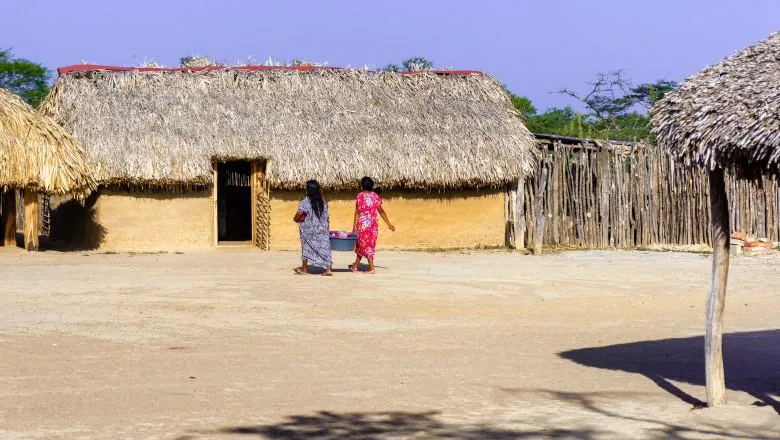“This amicus is a necessary step to ensure that the rights of indigenous communities are protected. The diversion of the river will not only affect their food and water security but also impede a central element of their cultural identities, spiritual lives and traditional activities.
Sneha Bhardwaj (2nd Year, LLB), student co-director, King's Human Rights and Environment Clinic.
25 May 2022
King's Legal Clinic files submission in Colombia to protect rights of river
Students from King’s Human Rights and Environment Clinic worked with non-governmental organisations and barristers from Doughty Street Chambers to produce the submission, which was filed at the Colombian Constitutional Court, in a case which pits indigenous communities against the mining giant Glencore.

In 2017, indigenous communities from an arid, semi-desert area in the north-east of Colombia successfully argued before the country’s Constitutional Court that a British-owned coal mining company should halt its proposed diversion of a local river, pending further investigations. The Court ordered the company, Carbones del Cerrejón (Cerrejón Coal), to create an ‘inter-institutional round table’ and involve the communities, civil society organisations, academics and other experts, to agree a way forward. The communities have subsequently complained that the company has failed to involve them sufficiently, and instead completed the diversion of the river, which has subsequently run dry.
The Arroyo Bruno (Bruno Stream) is a tributary of the desert region’s only major river, the Rio Rancheria. It is the communities’ water supply, it provides food through fishing, and it also plays a central role in the traditions and culture of the indigenous Wayuu people.

The company has diverted the stream to expand mining activities at the Cerrejón mine, which extends over a reported 690 square kilometres and is the largest open-cast coal mine in Latin America.
The communities, who are under threat due to climate change, are represented by a Colombian NGO, CAJAR, which has filed a claim for provisional measures in the Constitutional Court, on the basis that the Court’s judgment has not been respected. Two UK-based NGOs, ABColombia and the Colombian Caravana UK Lawyers Group, instructed the King’s Human Rights and Environment Clinic, which worked with barristers at Doughty Street Chambers to submit an urgent amicus curiae, or ‘friend of the court’, intervention to the Constitutional Court.
The amicus curiae, which is based on background research by King’s students and the Clinic’s Assistant Director and Supervising Solicitor, Sue Willman, was originally filed in 2020. It provides an independent analysis of applicable principles under international human rights and international environmental law. These include the precautionary principle, which requires parties to adopt protective measures where there is the strong suspicion of potential harm, and the prevention principle, which states that it is better to avoid harm than to allow it and then deal with the consequences.
The amicus also notes the need for adequate environmental and social impact assessments, and for the affected indigenous communities to be sufficiently involved in these processes.
The Clinic team researched indigenous people’s rights, cultural rights, and our rights to a healthy environment, water, food sovereignty, and health. The intervention links these rights to novel legal arguments on ‘rights of nature’, which recognise components of the natural world, such as rivers and forests, as legal interests in themselves, even in the absence of a risk of harm to human beings.
Working on this project allowed me to understand the relevance of the inextricable nature of the rights of indigenous people with the protection of environment and natural entities.
Sneha Bhardwaj
The legal submission was drafted by barristers Jelia Sane, Dr Keina Yoshida and Camila Zapata Besso of Doughty Street Chambers, on behalf of ABColombia and the Colombia Caravana UK Lawyers Group, with technical assistance from London Mining Network. It was re-filed on 24 May 2022 in the Constitutional Court of Colombia, in the wake of international arbitration claims by Cerrejón’s parent company against the Colombian state. The amicus is published here in Spanish and English.
At the time of the original judgment, Carbones del Cerrejón was jointly-owned by the London-listed mining companies BHP, AngloAmerican and Glencore. In June 2021, Glencore announced it had reached agreement with BHP and AngloAmerican to become sole owners of the Cerrejón mine.
The mine, which has been in production since 1985, has repeatedly expanded. A number of local indigenous communities have previously complained about the negative impacts of mining activities, including forcible resettlement.
King’s Legal Clinic aims to improve access to justice through a range of activities including; providing free legal advice to members of the public through its Legal Advice Clinic; and working with local and international organisations on research and justice projects.

